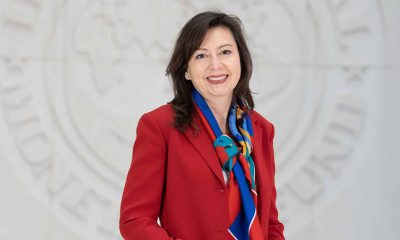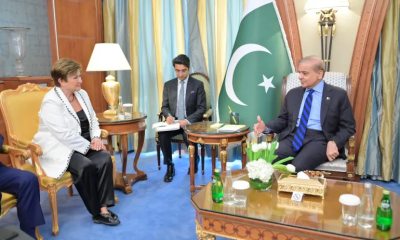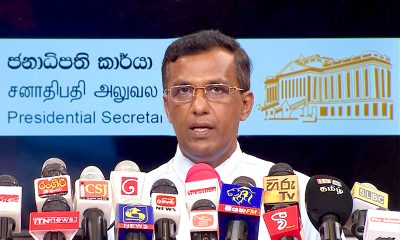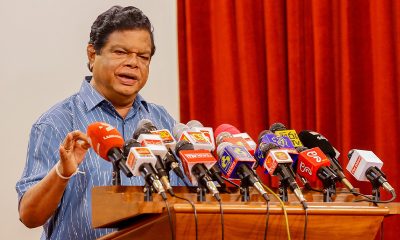News
President resists independent review by CC of his nominees to high posts – Lawyers’ Collective
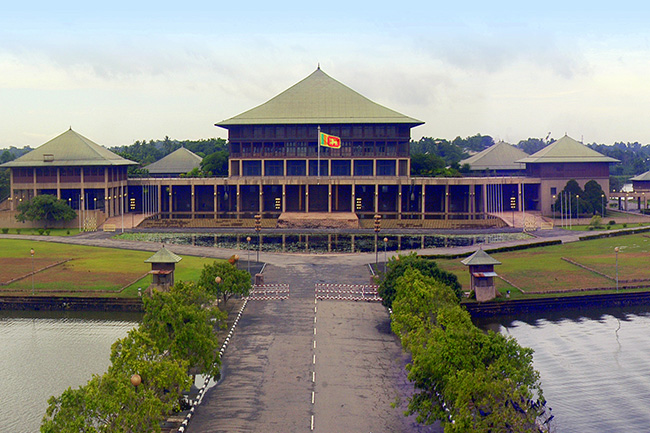
The Lawyers’ Collective (LC) has strongly condemned what it calls President Ranil Wickremesinghe’s attempt to intimidate the Constitutional Council of Sri Lanka.LC has said in a media statement: “The Lawyers’ Collective strongly condemns the recent attempt by President Wickremesinghe to intimidate the Constitutional Council of Sri Lanka. In an authoritarian move, on 23 November 2023, President Wickremasinghe in an address to Parliament entirely misrepresented the constitutional purpose of the Constitutional Council by stating that the ‘Council falls under the Executive’. The heavy handed and dangerous public comments of the President constitute a serious undermining of constitutionally imposed checks and balances in the governance of the country.
“The Constitutional Council (CC) was originally established by the 17th amendment to the Constitution of Sri Lanka in the year 2000 to vet presidential nominees to high posts prior to appointments being made by the President. The 19th Amendment re-established the Council. The 18th and 20th Amendments brought by Rajapaksa administrations abolished the CC as a means of regaining untrammelled powers of the Executive Presidency. Presently, the Council – now under the 21st amendment to the Constitution, is made up of the Prime Minister, the Speaker, the Leader of the Opposition, one Member of Parliament appointed by the President, five persons appointed by the President as nominated; one Member of Parliament nominated by agreement of the majority of the Members of Parliament representing the Government; one Member of Parliament nominated by agreement of the majority of the Members of Parliament of the political party or independent group to which the Leader of the Opposition belongs; three persons nominated by the Speaker by agreement of the Prime Minister and the Leader of the Opposition and one Member of Parliament nominated by agreement of the Members of Parliament other than those representing the Government and those belonging to the political party or independent group to which the Leader of the Opposition belongs, and appointed by the President. Three persons of those nominated by the speaker by agreement of the PM and Leader of the Opposition are to be persons of integrity, who have distinguished themselves in public life and who are not members of any political party.
“The Council was conceived in response to the largely unchecked powers of the President (a design of the 1978 Constitution) in making appointments to high posts such as Chief Justice, Supreme Court and Court of Appeal Judges, the Attorney General, Auditor General, Inspector General of Police, Secretary General of Parliament and the independent Commissions. The Council is a means of achieving national consensus on appointments that require persons of merit, integrity and acceptance across political divides to temper public perceptions of bias and partiality.
The Council was an integral step in depoliticising high public posts. It was also a leap in constitutional development towards securing public accountability and rebuilding public trust in key institutions. Since the Council was established, the executive has from time to time resisted the check placed on it by various means. There has been non-appointment of members and constitutional amendments that abolished the Council, one which replaced it with a rubber stamp Parliamentary Council. Many Presidents have struggled to abide by the high standards imposed by the Constitution.
“President Wickremesinghe, who heralded the 21st Amendment as a return to accountable governance has, by his recent statements in and outside of parliament, crossed a line. In an outrageous move, the President publicly found fault with the Council for failing to approve his nominee to the Supreme Court and his continuing requests to reappoint the current IGP long after his age of retirement. The Constitutional Council is fulfilling its obligations in refusing this reappointment.
He also makes broad claims that the lack of approval has resulted in the police not functioning and the courts coming to a standstill. The President’s decision to appoint a Parliamentary Select Committee to probe into ‘delays’ by the CC constitutes a threat to the members of the Constitutional Council who are constitutionally mandated to deliberate on and independently decide on whether or not a presidential nominee will be approved. If only one candidate is nominated and CC approval is not given, he must hasten to place one or more better suited candidates for approval. He cannot expect to nominate one person and when the CC cannot endorse such person, resort to public complaints and threats against the Council. In fact, it demonstrates the President to disregard of clear constitutional limitations on his executive powers.
“The Lawyer’s Collective notes the growing authoritarianism of a President who serves without a mandate from the people. People’s sovereignty as articulated by the Constitution cannot be flippantly dismissed. This has been powerfully stated in several Supreme Court decisions including a majority decision delivered last week on the economic crisis.
By several previous statements we have raised concerns that the damage to public trust is long lasting. In the wake of an economic and political crisis, and people having expressed their strong desire for change, the conduct of the President signals a failure to break away from undemocratic governance practices of the past, breaching his own pledge of support for the 21st Amendment.
“It is vital that the corporate sector as well as the international community including the International Monetary Fund take grave notice of the growing authoritarianism of the President and the impact it has on good governance and the rule of law in Sri Lanka. If this authoritarian trajectory of the President continues unchecked, it will only lead to political upheaval and further economic uncertainty.”
Signatories to the LC statement are: Upul Jayasuriya, President’s Counsel, Dr. Jayampathy Wickramaratne, President’s Counsel, Professor Savitri Goonesekere, Attorney-at-Law, Geoffrey Alagaratnam, President’s Counsel, M.A. Sumanthiran, President’s Counsel, Dulindra Weerasooriya, President’s Counsel, Dinal Phillips, President’s Counsel, Saliya Pieris, President’s Counsel, S.T. Jayanaga, President’s Counsel, Nalin Dissanayake, President’s Counsel, Lal Wijenayake, Attorney-at-Law, Professor Deepika Udagama, Professor Camena Gunaratne, Upul Kumarapperuma, Attorney-at-Law, K.W. Janaranjana, Attorney-at-Law, Srinath Perera, Attorney-at-Law, Akalanka Ukwatta, Attorney-at-Law, Ermiza Tegal, Attorney-at-Law and Manoj Nanayakkara, Attorney-at-Law
News
US sports envoys to Lanka to champion youth development

The U.S. Embassy in Colombo welcomed the U.S. Sports Envoys to Sri Lanka, former National Basketball Association (NBA) and Women’s National Basketball Association (WNBA) players Stephen Howard and Astou Ndiaye, from June 8 through 14.
The Public Diplomacy section of the U.S. Embassy said that it would launch a weeklong basketball program intended to harness the unifying power of sports, made possible through collaboration with Foundation of Goodness and IImpact Hoop Lab.
While in Sri Lanka, Howard and Ndiaye, both retired professional basketball players, will conduct a weeklong program, Hoops for Hope: Bridging Borders through Basketball. The Sports Envoys will lead basketball clinics and exhibition matches and engage in leadership sessions in Colombo and Southern Province for youth aged 14-18 from Northern, Uva, Eastern and Western Provinces, offering skills and leadership training both on and off the court. The U.S. Envoys will also share their expertise with the Sri Lanka Basketball Federation, national coaches, and players, furthering the development of basketball in the country. Beyond the clinics, they will collaborate with Sri Lankan schoolchildren to take part in a community service project in the Colombo area.
“We are so proud to welcome Stephen and Astou as our Sports Envoys to Sri Lanka, to build on the strong people-to-people connections between the United States and Sri Lanka,” said U.S. Ambassador Julie Chung. “The lessons that will be shared by our Sports Envoys – communication, teamwork, resilience, inclusion, and conflict resolution – are essential for leadership development, community building, equality, and peace. The U.S. Sports Envoy program is a testament to our belief that sports can be a powerful tool in promoting peace and unity.”
News
Rahuman questions sudden cancellation of leave of CEB employees

SJB Colombo District MP Mujibur Rahuman in parliament demanded to know from the government the reasons for CEB suspending the leave of all its employees until further notice from Thursday.
MP Rahuman said that the CEB has got an acting General Manager anew and the latter yesterday morning issued a circular suspending leave of all CEB employees with immediate effect until further notice.
“We demand that Minister Kanchana Wijesekera should explain this to the House. This circular was issued while this debate on the new Electricity Amendment Bill was pending. There are many who oppose this Bill. The Minister must tell parliament the reason for the urge to cancel the leave of CEB employees,” the MP said.However, Speaker Mahinda Yapa Abeywardena prevented Minister Wijesekera responding to the query and said that the matter raised by MP Rahuman was not relevant.
News
CIPM successfully concludes 8th Annual Symposium

The Chartered Institute of Personnel Management (CIPM) successfully concluded the 8th Annual CIPM Symposium, which took place on 31st May 2024. Themed “Nurturing the Human Element—Redefining HRM in a Rapidly Changing World,” the symposium underscored the pivotal role of human resource management (HRM) in today’s dynamic global landscape. Since its inception in 1959, CIPM has been dedicated to advancing the HR profession through education, professional development, and advocacy, solidifying its position as Sri Lanka’s leading professional body for HRM.
Ken Vijayakumar, the President of the CIPM, graced the occasion as the chief guest. The symposium commenced with the welcome address by the Chairperson, Prof. Arosha Adikaram, followed by the Web Launch of the Symposium Proceedings and Abstract Book by the CIPM President. The event featured distinguished addresses, including a speech by Chief Guest Ken Vijayakumar, President of CIPM, and an address by Guest of Honor Shakthi Ranatunga, Chief Operating Officer of MAS Holdings Pvt. Ltd., Sri Lanka.
The symposium also featured an inspiring keynote address by Prof. Mario Fernando, Professor of Management and Director of the Centre for Cross Cultural Management (CCCM) at the University of Wollongong, Australia.
Vote of Thanks of the inauguration session was delivered by Dr. Dillanjani Weeratunga, Symposium Co-chair.
The symposium served as a comprehensive platform for researchers to present their findings across a wide range of critical topics in HRM. These included Cultural Diversity and Inclusion, Talent Development and Retention, Ethical Leadership and Corporate Social Responsibility, Adapting to Technological Advancements, Mental Health and Well-being at Work, Global Workforce Challenges, Employee Empowerment, and Reskilling and Upskilling.
The plenary session was led by Prof. Wasantha Rajapakse. Certificates were awarded to the best paper presenters during the valedictory session, followed by a vote of thanks delivered by Kamani Perera, Manager of Research and Development.
The annual symposium of CIPM was a truly inclusive event, attracting a diverse audience that spanned undergraduates, graduates, working professionals, research scholars and lecturers. This widespread interest highlights the symposium’s significance in the field of HRM, offering a unique opportunity for everyone to network and learn from scholarly brains.The CIPM International Research Symposium was sponsored by Hambantota International Port, Sri Lanka Institute of Information Technology (SLIIT), E B Creasy & Co. PLC, and Print Xcel Company.


